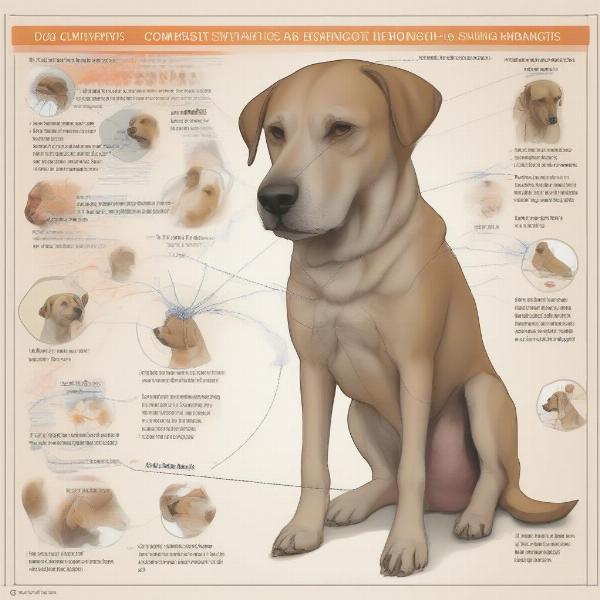Meningitis in dogs is a serious condition involving inflammation of the membranes surrounding the brain and spinal cord. It can be caused by a variety of factors, including bacterial, viral, fungal, or parasitic infections, as well as non-infectious causes such as immune-mediated diseases or reactions to certain medications. Understanding the symptoms, diagnosis, and treatment options is crucial for any dog owner in the UK.
Recognizing the Signs of Meningitis in Your Dog
Early detection of meningitis is vital for effective treatment. Be vigilant for these symptoms, which can vary depending on the underlying cause and the severity of the inflammation:
- Changes in Behaviour: Look out for unusual aggression, anxiety, disorientation, or depression.
- Neurological Issues: These can manifest as seizures, tremors, incoordination, head tilt, circling, or difficulty walking.
- Pain and Stiffness: Dogs with meningitis may exhibit sensitivity to touch, especially around the neck and back, and may have a stiff gait.
- Fever: An elevated body temperature can be a sign of infection.
- Loss of Appetite and Lethargy: A general lack of energy and disinterest in food can also indicate illness.
- Vomiting and Diarrhea: These gastrointestinal issues may accompany other symptoms.
- Sensitivity to Light and Sound: Dogs with meningitis may become more sensitive to stimuli.
 Meningitis Symptoms in Dogs
Meningitis Symptoms in Dogs
Diagnosing Meningitis: Veterinary Expertise is Essential
If you suspect your dog has meningitis, immediate veterinary attention is crucial. The diagnostic process typically involves:
- Physical Examination: Your vet will assess your dog’s neurological function and check for signs of pain and stiffness.
- Blood Tests: These can help identify underlying infections or other abnormalities.
- Cerebrospinal Fluid (CSF) Analysis: This is the most definitive diagnostic test for meningitis. CSF is collected via a spinal tap and analyzed for the presence of infectious agents, inflammatory cells, and other markers.
Treatment Options and Prognosis for Meningitis in Dogs
Treatment for meningitis depends on the underlying cause. Bacterial meningitis is typically treated with aggressive antibiotic therapy. Other causes may require different approaches, such as antiviral medications for viral meningitis or immunosuppressive drugs for immune-mediated meningitis. Supportive care, including pain management and fluid therapy, is also essential.
The prognosis for meningitis varies depending on the cause, severity, and how quickly treatment is initiated. Early diagnosis and aggressive treatment greatly improve the chances of recovery.
What are the long-term effects of meningitis in dogs?
Long-term effects of meningitis can range from mild to severe and include persistent neurological deficits, such as seizures, blindness, or deafness. Some dogs may require ongoing medication or therapy to manage these complications.
How can I prevent meningitis in my dog?
Preventing meningitis completely can be challenging, as some causes are unavoidable. However, vaccinating your dog against common infectious diseases, such as distemper and leptospirosis, can help reduce the risk of infection-related meningitis. Maintaining good overall health through a balanced diet, regular exercise, and parasite prevention can also strengthen your dog’s immune system.
Conclusion: Act Fast to Protect Your Canine Companion
Meningitis in dogs is a serious condition that requires immediate veterinary attention. By being aware of the symptoms and seeking prompt diagnosis and treatment, you can significantly improve your dog’s chances of recovery and minimize the risk of long-term complications.
FAQs:
- What is the most common cause of meningitis in dogs? Bacterial infections are a frequent cause.
- Can dogs recover fully from meningitis? Yes, many dogs can recover fully, especially with early and aggressive treatment.
- Is meningitis contagious in dogs? While some infectious causes of meningitis can be transmitted between dogs, the disease itself is not directly contagious.
- How long does it take to treat meningitis in dogs? Treatment duration varies depending on the cause and severity, but it can often take several weeks or even months.
- What are the signs of meningitis in puppies? Similar to adult dogs, but puppies may be more susceptible to severe complications.
- Are certain breeds more prone to meningitis? Some breeds may have a slightly higher predisposition to certain types of meningitis, but any breed can be affected.
- What should I do if I suspect my dog has meningitis? Contact your veterinarian immediately for an appointment.
Find More Helpful Information on ILM Dog:
(This section will be populated with internal links to relevant articles on the website if available. If no relevant articles are found, this section will be omitted.)
About ILM Dog:
ILM Dog (ilmdog.com) is your trusted international resource for expert dog care advice. We offer comprehensive guides on everything from breed selection and puppy care to senior dog health, training, nutrition, and much more. Our team is dedicated to providing dog owners worldwide with the knowledge and resources they need to ensure the health and happiness of their canine companions. For expert advice tailored to your dog’s specific needs, contact us at [email protected] or call us at +44 20-3965-8624.